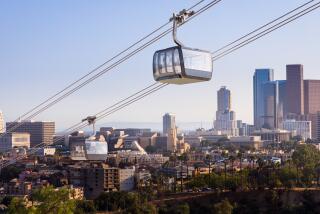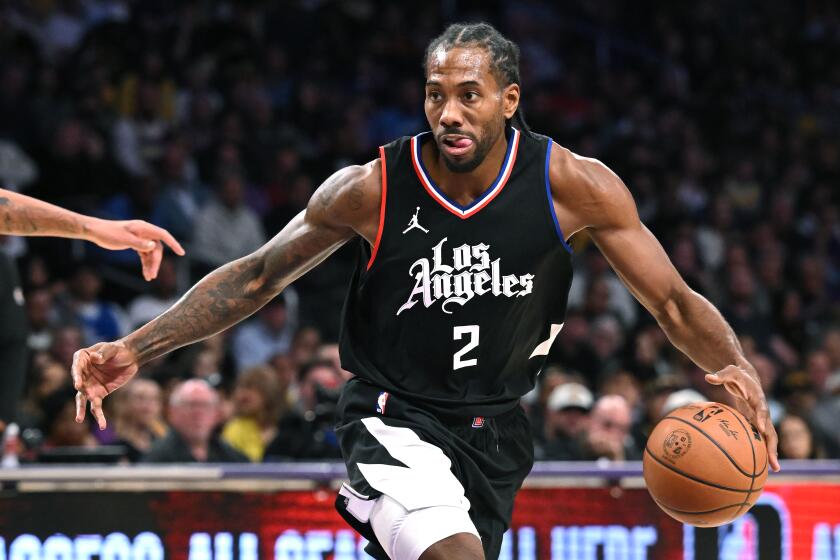AEG, Farmers Insurance in naming-rights deal for proposed NFL stadium
Backers of a plan to build a football stadium in downtown Los Angeles are set to announce Tuesday that they have reached a naming-rights deal worth $700 million, which would be the most valuable such agreement ever and a significant step toward bringing an NFL team to Los Angeles.
AEG, the huge entertainment company that, among other holdings, owns Staples Center and the L.A. Live complex, plans to announce a 30-year agreement with Farmers Insurance. The deal would provide AEG’s proposed project a crucial chunk of contractually obligated income, starting at $20 million for the first year and escalating incrementally every year after, according to individuals familiar with the negotiations but not involved in them. The stadium would be named Farmers Field.
Announcing a naming-rights deal for a stadium that has not been built, on a site that has not been approved, for a team that has not been acquired is unheard of. No money will change hands unless each of those wishes becomes fulfilled. But for AEG, making an announcement now provides a concrete benefit — providing a sense of momentum as the company, owned by billionaire Philip Anschutz, tries to persuade state and city officials to approve other crucial deal points, including a long-term lease agreement on the land for the stadium and expedited review of the environmental impact of building it.
In a display of support for their proposal for a $1-billion downtown stadium, AEG officials plan to unveil the agreement at a news conference Tuesday attended by Mayor Antonio Villaraigosa, other municipal officials, business leaders and sports stars. The mayor has a close relationship with AEG President and Chief Executive Tim Leiweke, but has so far not spoken publicly on the stadium plan.
The agreement with Farmers significantly increases the likelihood of the NFL’s return to Los Angeles, but does not guarantee it, NFL leaders said. AEG will need to weather a likely litigious entitlement process lasting a year or longer. Its plan also is in competition with that of real estate magnate Ed Roski, who is proposing a stadium in the city of Industry. And, ultimately, the potential owners need to convince an existing NFL franchise to move to L.A. — a goal that has eluded several previous groups.
AEG has had discussions with every NFL team that could potentially move, Leiweke said in an interview, although he declined to list them. League officials have made it clear, however, that the L.A. vacancy will not be addressed until the current labor dispute between team owners and players is resolved. That could take months. The teams considered potentially movable because of their stadium leases are San Diego, Jacksonville, Minnesota, Oakland, San Francisco, St. Louis and Buffalo.
Leiweke said the deal with Farmers “doesn’t mean that football is back tomorrow. But it means we took probably the most significant step in the last 15 years to getting football back here soon.”
Two highly influential members of NFL ownership families agreed that the naming-rights deal distinguishes the downtown plan from any that has come before it.
“If I’m a fan in L.A., I have to be really encouraged,” said Stephen Jones, chief operating officer of the Dallas Cowboys and son of team owner Jerry Jones. “You’ve got to be encouraged that there is a real chance for football there. Every owner to a man thinks that we’ve got to have a team in the second-largest market in the country.”
Jones said he was particularly impressed that AEG had reached a naming-rights agreement on a proposed venue when there are still no deals for the NFL’s two newest stadiums, the homes of the Cowboys and New York Giants and Jets.
But, “we’ve got to get a labor agreement before any of this happens,” Jones said. “That’s where our focus is.”
Jonathan Kraft, president of the New England Patriots and son of team owner Robert Kraft, said a deal of the size of the Farmers agreement is “very impressive,” particularly in this difficult economic climate. Kraft’s family has been a partner in Major League Soccer for 16 years with Anschutz.
“When you take a naming-rights deal like that, and their history of building and running venues, nothing can compete with this,” Kraft said.
Critics of AEG’s plan take issue with the location of the proposed 64,000-seat, retractable-roof stadium, which would be part of the Convention Center complex at the intersection of the I-10 and I-110 freeways. They question the potential traffic and parking problems a stadium could cause and whether the project can be completed without a significant contribution of public money, as Leiweke has promised.
AEG is asking the city to issue $350 million in bonds. The money would pay for tearing down and rebuilding the Convention Center’s West Hall and parking and would pay off the remaining debt on the hall. Leiweke said new revenue the city would get from the site, mostly from ticket taxes, would be enough to pay off that debt, and AEG would pay any shortfalls.
AEG’s proposal calls for the stadium to be used not just for 10 football games a year, but other sports events such as NCAA Final Fours and major soccer games and for conventions. Farmers has been promised at least 50 events per year, with an attendance of at least 40,000 per event.
The Industry proposal is significantly ahead of the downtown bid in that it is shovel-ready with a piece of land that already has necessary zoning and the environmental exemption that AEG is seeking from the state. Additionally, Industry backers say their site is far more accessible for fans in San Bernardino and Orange counties, as well as much of Los Angeles.
Several NFL owners and executives have quietly indicated they prefer the AEG concept to Roski’s.
Kraft emphasized that any decision on returning to the L.A. market will be made by all 32 owners and the league office, not by an individual franchise impressed by a proposal.
“But,” he added, “this is as credible as anything that has taken place since the expansion [in 1998] that brought Houston into the league when L.A. had a chance then and didn’t win it.”
Leiweke said the naming-rights deal should stand as proof that Anschutz is committed to getting the event center built.
“I’m sure every owner in the league today looks at this and says, ‘This is going to happen,’” Leiweke said.
Leiweke said he’s relying on the muscle of L.A.’s business, community and political leaders to help make the event center a reality. He cautioned, however, that Anschutz has “clearly warmed up” to the idea but that building an NFL stadium “is not his life ambition.”
AEG hopes to have the stadium built in time for the 2015 NFL season, so the stadium could host the 50th Super Bowl in early 2016. The timing is meaningful to the NFL because L.A. was the site of the first Super Bowl. Making the deadline even tighter, AEG would have to build the new West Hall before beginning demolition on the existing one, so no currently booked conventions would be disrupted.
Farmers, the largest auto insurance company in California, was founded in L.A. and has been headquartered here for 83 years. The company sponsors the PGA Tour’s Farmers Insurance Open at Torrey Pines each January, the Farmers Classic tennis tournament, and has an airship.
“I’ve been in this business for 10 years and have worked for hundreds of sponsorship agreements,” said Shervin Mirhashemi, chief operating officer of AEG Global Partnership and negotiator of the deal. “This is a unique relationship with Farmers Insurance, and I’ve never seen anything of the like. We may never see one like this again, and that’s what makes it so unique and powerful.”
Kevin Kelso, chief marketing officer for Farmers, called the agreement “a fantastic branding opportunity” and “a great way to give back to the city.”
L.A. businessman Casey Wasserman, who brought the downtown stadium concept to AEG, said: “It’s the first time L.A. has provided a solution to the questions required to bring a team back. This plan guarantees the NFL and a team financial success.”
For the moment, Leiweke is optimistic the deal will be done.
“Even if you don’t like football, you’ve got to love the Convention Center and the economic impact this is going to create,” he said. “We’ve taken a major step forward to putting L.A. in a position to be a top-five convention market in the United States going forward.
“If you don’t like football, you’ve got to love that. And it didn’t cost you a penny.”
More to Read
Get our high school sports newsletter
Prep Rally is devoted to the SoCal high school sports experience, bringing you scores, stories and a behind-the-scenes look at what makes prep sports so popular.
You may occasionally receive promotional content from the Los Angeles Times.






